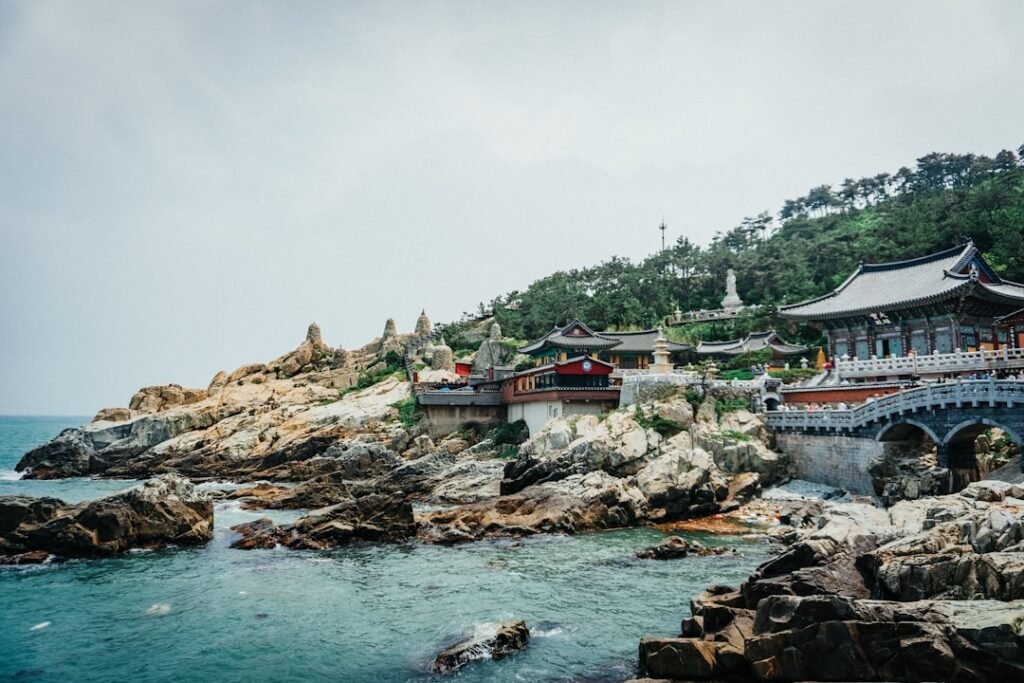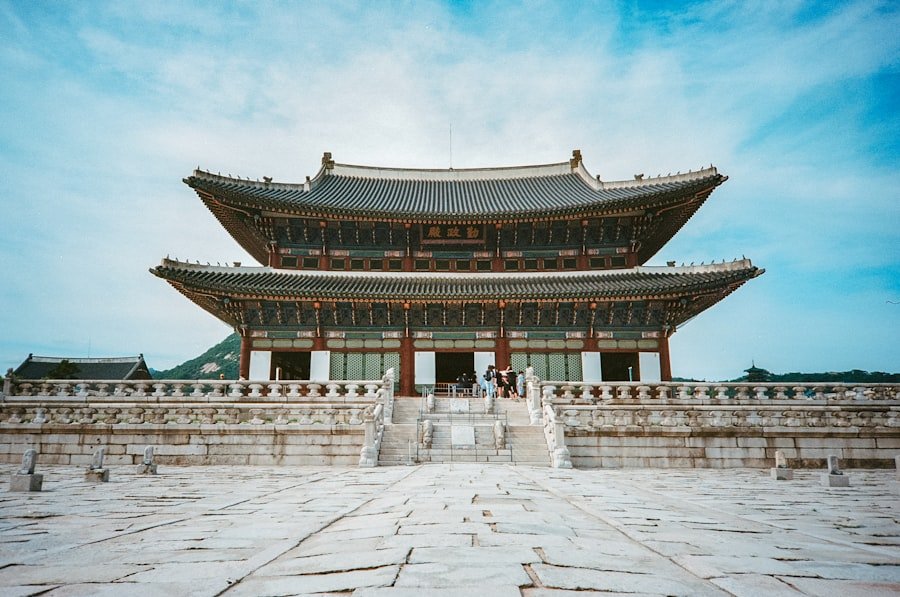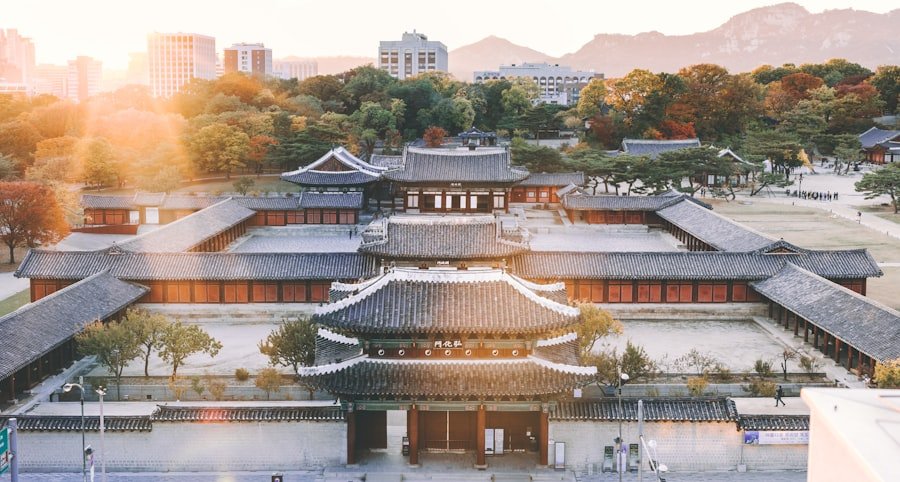

Key Korean Phrases for a Beach Trip to Haeundae
When embarking on a journey to a new country, the first step often involves mastering the art of greetings and introductions. In South Korea, a warm and respectful greeting can set the tone for any interaction. The most common way to say hello is “Annyeong haseyo,” which is polite and suitable for most situations.
It is essential to understand that greetings in Korean culture are not merely a formality; they are a reflection of respect and social hierarchy. When meeting someone for the first time, it is customary to bow slightly while offering your greeting, as this gesture signifies respect. In addition to verbal greetings, introducing oneself is equally important.
When introducing yourself, you might say, “Je ireun [Your Name] imnida,” which translates to “My name is [Your Name].” It is also polite to inquire about the other person’s name by asking, “Seongham-eun mueos-ibnikka?” This translates to “What is your name?” Engaging in these simple yet meaningful exchanges can foster connections and create a welcoming atmosphere, making your experience in South Korea all the more enjoyable. Learn Korean in Oslo! NLS Norwegian Language School is now offering classes. Register today.
Table of Contents
ToggleSummary
- When greeting someone in the UK, a simple “hello” or “hi” is often sufficient, and a handshake is a common form of introduction.
- When ordering food and drinks, it’s polite to say “please” and “thank you” to the server, and tipping is generally appreciated but not always expected.
- When asking for directions, it’s helpful to start with “excuse me” and then ask for the specific location or place you are trying to find.
- In the UK, bargaining is not a common practice in most shops, but it’s acceptable to ask if there are any discounts or promotions available.
- When enjoying beach activities and water sports, it’s important to follow any safety instructions and be mindful of other beachgoers.
Ordering Food and Drinks
One of the most delightful aspects of visiting South Korea is the opportunity to indulge in its rich culinary landscape. When it comes to ordering food and drinks, familiarity with a few key phrases can enhance your dining experience significantly. Upon entering a restaurant, you might be greeted with “Oseyo!” which means “Welcome!” To place your order, you can say, “Jeogiyo,” which means “Excuse me,” followed by your desired dish.
For instance, if you wish to order bibimbap, you would say, “Bibimbap juseyo,” meaning “Please give me bibimbap.” Understanding the menu can sometimes be a challenge, especially if it is written in Korean. However, many restaurants in tourist areas offer English menus or have pictures of the dishes. If you find yourself unsure about what to order, do not hesitate to ask the staff for recommendations.
A simple phrase like “Mwo recommend haeseyo?” translates to “What do you recommend?” This not only helps you navigate the menu but also opens up an opportunity for conversation with the locals.
Asking for Directions

Navigating a new city can be daunting, but knowing how to ask for directions can make your journey much smoother. In South Korea, people are generally friendly and willing to help, even if there is a language barrier. To ask for directions, you can start with “Juseyo,” meaning “Excuse me,” followed by “Eodi-ya?” which translates to “Where is it?” For example, if you are looking for a specific landmark like Gyeongbokgung Palace, you would say, “Gyeongbokgung gung eodi-ya?” It is also helpful to learn some directional phrases.
For instance, “Wae” means “left,” and “Oren” means “right.” If you need further clarification, you can ask, “Igeul juseyo?” which means “Can you show me this?” Pointing at a map or using a translation app can also aid in communication. Remember that patience and politeness go a long way when seeking assistance from locals.
Shopping and Bargaining
Shopping in South Korea can be an exhilarating experience, especially in bustling markets and trendy boutiques. When entering a shop, it is customary to greet the shopkeeper with a friendly “Annyeong haseyo.” If you are interested in an item, you can ask about its price by saying, “Ige eolma-ya?” which translates to “How much is this?” In many cases, prices are fixed; however, in traditional markets or smaller shops, bargaining may be acceptable. If you feel that the price is too high, do not hesitate to negotiate politely.
You might say, “Jogeum maneun geon anin geonji?” meaning “Can you lower the price a bit?” It is essential to maintain a friendly demeanour during this process; a smile can go a long way in making the shopkeeper more amenable to your request. Once you have settled on a price, expressing gratitude with a simple “Gamsahamnida” will leave a positive impression.
Beach Activities and Water Sports
South Korea boasts some stunning beaches, with Haeundae Beach in Busan being one of the most popular destinations for both locals and tourists alike. The beach offers an array of activities that cater to all interests. Whether you are keen on sunbathing or seeking adventure through water sports, Haeundae has something for everyone.
If you wish to rent equipment for activities such as jet skiing or paddleboarding, simply approach the rental kiosks and inquire with “Jeonmang juseyo,” meaning “Please give me equipment.” For those who prefer a more relaxed experience, lounging on the sandy shores while sipping on refreshing drinks is equally appealing. You might want to try some local snacks available from beach vendors; simply ask for recommendations by saying, “Mwo masisseoyo?” which translates to “What is delicious?” Engaging with locals at the beach can lead to memorable experiences and perhaps even new friendships.
Emergency Phrases

While travelling is often filled with joy and excitement, it is crucial to be prepared for unexpected situations that may arise. Knowing some emergency phrases can provide peace of mind during your travels in South Korea. If you find yourself in need of assistance or medical help, saying “Daeum-eul juseyo” means “Help!” This phrase can be vital in situations where immediate attention is required.
Additionally, it is wise to learn how to express that you need medical assistance by saying “Uisa-reul bulleojuseyo,” which translates to “Please call a doctor.” Familiarising yourself with these phrases can make navigating emergencies less stressful. It is also advisable to have important contact numbers saved on your phone or written down in case of emergencies.
Expressing Gratitude and Politeness
In Korean culture, expressing gratitude and politeness is paramount. A simple “Gamsahamnida” goes a long way in showing appreciation for someone’s help or kindness. Whether it’s thanking a shopkeeper after making a purchase or expressing gratitude after receiving assistance with directions, this phrase will endear you to locals and enhance your interactions.
Moreover, using polite language consistently demonstrates respect for Korean customs. When addressing someone older or in a position of authority, adding “-nim” after their title or name shows additional respect. For example, if you are thanking a teacher or elder, saying “Gamsahamnida” followed by their title will convey your appreciation more profoundly.
Talking about the Weather
Discussing the weather is a universal small talk topic that can help break the ice when meeting new people. In South Korea, weather conditions can vary significantly throughout the year, making it an excellent conversation starter. To ask about the weather, you might say “Nalssi eotteohge dwaeyo?” which translates to “How is the weather?” If you want to share your thoughts on the weather, you could say “Haeul-i johaeyo,” meaning “The weather is nice,” or “Borae-i nawa,” which means “It’s raining.” Engaging in conversations about the weather not only helps you connect with locals but also provides insight into their daily lives and experiences.
Making Small Talk with Locals
Making small talk with locals can enrich your travel experience significantly. Koreans are generally friendly and open to conversations with foreigners. A good way to start small talk is by asking about their favourite local food or places to visit.
You might say “Jeil johaehaejuin geos-eun mueos-ibnikka?” which translates to “What do you recommend as the best thing here?” Additionally, discussing cultural differences or sharing your experiences can lead to engaging conversations. Koreans often appreciate when foreigners show interest in their culture and traditions. By asking questions about local customs or festivals, you not only learn more about their way of life but also create opportunities for deeper connections.
Using Public Transport
South Korea boasts an efficient public transport system that makes getting around cities like Seoul and Busan convenient and affordable. Familiarising yourself with basic phrases related to public transport can ease your travel experience significantly. To inquire about train schedules or routes, you might say “Jeonjaeng-eul juseyo,” meaning “Please give me information about the train.” When boarding public transport, it’s essential to have your destination written down in Korean or saved on your phone for easy reference.
If you’re unsure where to get off, don’t hesitate to ask fellow passengers for assistance using phrases like “Igeul juseyo?” meaning “Is this the right place?” Most locals will be more than willing to help you navigate your journey.
Enjoying the Nightlife and Entertainment at Haeundae Beach
As the sun sets over Haeundae Beach, the vibrant nightlife begins to unfold. The area transforms into a lively hub filled with bars, clubs, and entertainment venues that cater to all tastes. Whether you’re looking for live music or a dance floor to let loose on, Haeundae has it all.
To find out where the best spots are located, simply ask locals or fellow travellers by saying “Eotteoke jeongmal jaemiissneun lugar-eul al su iss-eoyo?” which translates to “Where can I find really fun places?” When enjoying nightlife at Haeundae Beach, don’t forget to try some local drinks like soju or makgeolli while mingling with others. Engaging in conversations over drinks can lead to unforgettable experiences and friendships that last beyond your trip. Remember that being polite and respectful while enjoying the nightlife will ensure that everyone has a good time.
In conclusion, immersing yourself in Korean culture through language and social interactions can greatly enhance your travel experience in South Korea. From greetings and ordering food to navigating public transport and enjoying nightlife at Haeundae Beach, every interaction offers an opportunity for connection and understanding. For those interested in delving deeper into the Korean language and culture, consider enrolling in Korean courses at the NLS Norwegian Language School in Oslo.
Their comprehensive curriculum caters to all levels of learners and provides an excellent foundation for anyone looking to explore Korea more fully during their travels.





